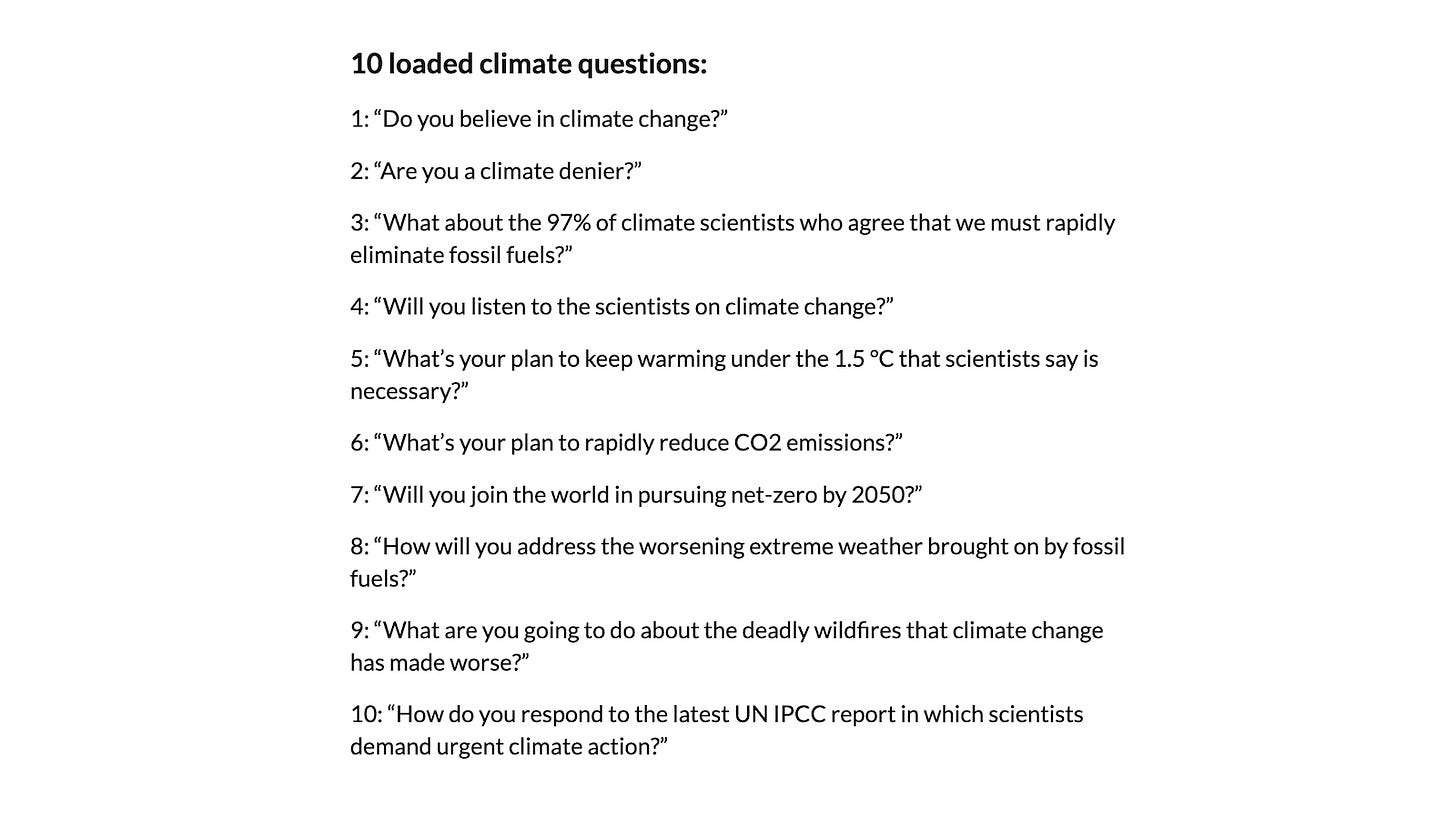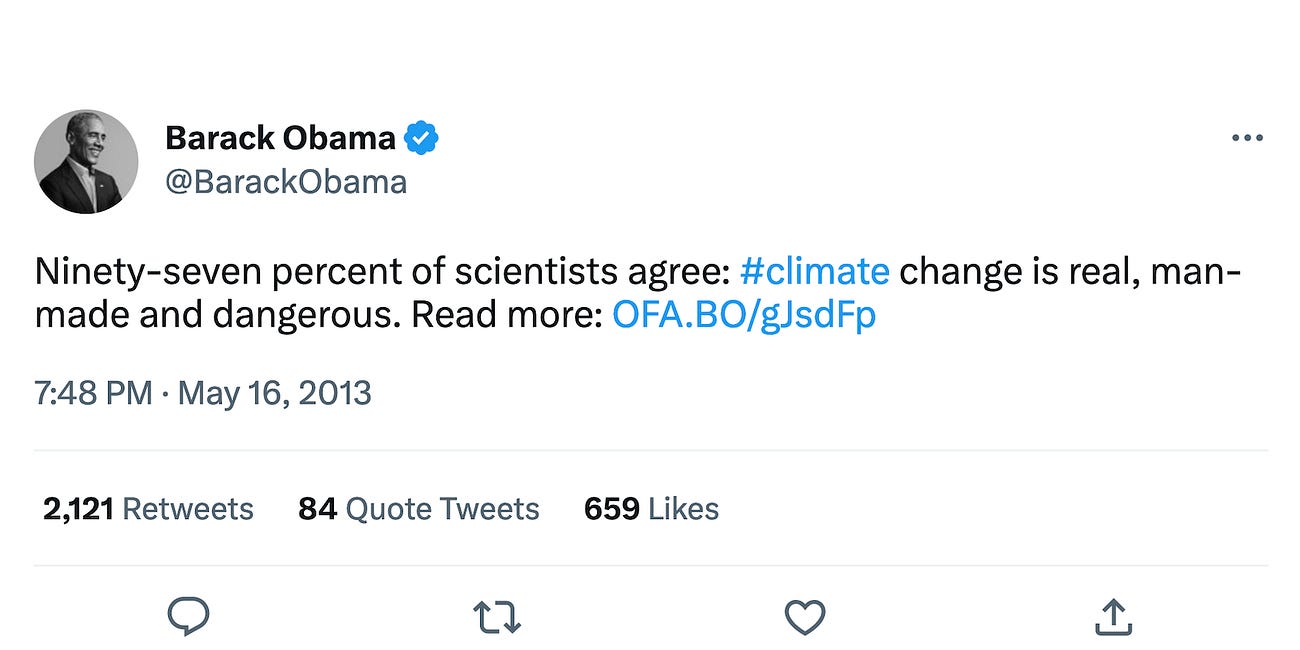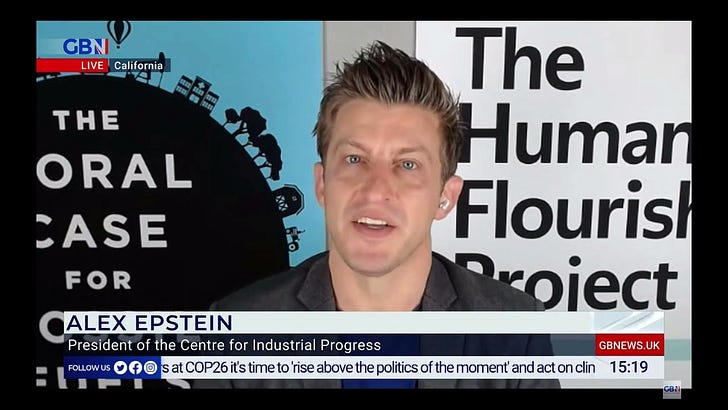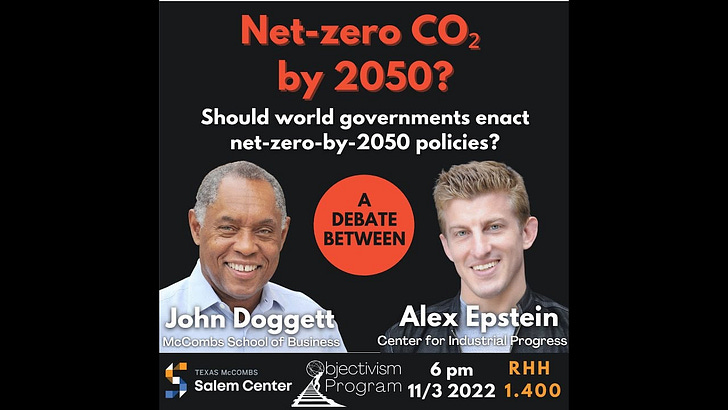How to answer loaded climate questions
Answers to: “Do you believe in climate change?” “Are you a climate denier?” “Will you listen to the scientists on climate change?” And more!
As the Presidential race heats up, we’ll see candidates asked many “loaded questions” about climate—questions based on dubious assumptions that serve the questioner’s agenda.
Here are answers to 10 popular loaded climate questions.
1: Do you believe in “climate change”?
If by “climate change,” you mean some human impact on climate, yes.
But I don’t believe in “climate crisis.”
As the world has warmed ~1°C in the last century, climate disaster deaths have fallen 98% thanks in large part to fossil fuels.Fossil fuels' CO2 emissions have contributed to the warming of the last 100 years, but that warming has been mild and manageable—~1°C, mostly in the colder parts of the world. And life on Earth thrived (and was far greener) when CO2 levels were at least 5 times higher than today's.1
Fossil fuels have actually made us far safer from climate by providing low-cost energy for the amazing machines that protect us against storms, protect us against extreme temperatures, and alleviate drought. Climate disaster deaths have decreased 98% over the last century.2
“Do you believe in ‘climate change’?” is an extremely vague question.
It doesn’t specify what the magnitude of the change is, to what extent it’s negative or positive, and to what extent it’s human-caused.
Everyone “believes in climate change” at this level of vagueness.The intent of the vagueness of “Do you believe in climate change?” is to get you to say “yes” because you (correctly) believe in some human impact on climate, then take that “yes” to mean that you (falsely) concede a catastrophic human impact on climate—a “climate crisis.”
“Do you believe in climate change?” is also a misleading question, because it asks you to take a position only on the climate side-effects of fossil fuels (“climate change”) while ignoring their huge benefits (including their benefits in protecting us from climate danger).
For an in-depth explanation of why climate impact (“climate change”) is real, but “climate crisis” isn’t, read this.
2: Are you a “climate denier”?
I’m a climate thinker.
I think about the climate side-effects of fossil fuel use in a precise, not exaggerated way, and I also think about the many benefits of fossil fuel use—including the climate benefits that make us safer than ever from climate.For more on how to be a “climate thinker,” read this.
The irrefutable case for a Fossil Future
·If we want a world in which all 8 billion of us have the opportunity to flourish—to live long, healthy, prosperous, fulfilling lives—we need to use more, not less, fossil fuel going forward. I explain this comprehensively in my book Fossil Future. Here’s a
3: What about the 97% of climate scientists who agree that we must rapidly eliminate fossil fuels?
The “97%” studies reflect widespread agreement that humans have some climate impact, not catastrophic impact.
They don’t justify the disastrous policy of rapidly eliminating fossil fuels.For a full breakdown of the “97% of climate scientists agree” fallacy, read this:
The myth that "97% of climate scientists agree" about a climate crisis
·Myth: 97% of climate scientists agree that we face a climate crisis that requires the rapid elimination of fossil fuels. Truth: Most climate scientists agree that we have some climate impact. This does not at all justify the rapid elimination of fossil fuels
4: Will you listen to the scientists on climate change?
In considering energy policy I will listen to accurate summaries of climate science, along with accurate summaries of other relevant fields such as energy economics.
I will reject distortions and politicizations of science.For an in-depth explanation of what’s wrong with “listen to the scientists” or “listen to the climate scientists” on energy policy, read this.
5: What’s your plan to keep warming under the 1.5°C that scientists say is necessary?
The goal of rapidly eliminating fossil fuels to limit warming to 1.5°C since the 1800s—~0.5°C from today—in a world where far more people die of cold than of heat—is genocidal pseudoscience.3For an in-depth explanation of the murderous and pseudoscientific nature of the “1.5°C goal,” read this:
Talking Points on COP 26, 1.5°C pseudoscience
·While COP 26 is drawing criticism for “failing” to “achieve” its goals, this conference is still pushing the world in the deadly direction of eliminating fossil fuel use. Here are some key talking points centered around the pseudoscientific 1.5°C threshold of warming that is used to justify so much destruction.
6: What’s your plan to rapidly reduce CO2 emissions?
Such a plan would be ruinous.
CO2 emissions reduction can only be achieved humanely and practically long-term, by developing globally cost-competitive alternatives.
I will liberate nuclear and other promising alternatives.For an in-depth explanation of a pro-energy, pro-human, pro-freedom approach to CO2 emissions, read this:
A pro-human, pro-freedom policy for CO2 emissions
·America is taking a “punish America” approach to reducing CO2, making our energy more expensive and less reliable while China, Russia, and others increase their emissions. We need a “liberate American innovation” policy instead. The Reality The only moral and practical way to reduce CO2 emissions is innovation that makes low-carbon energy globally cost-com…
7: Will you join the world in pursuing net-zero by 2050?
No one is actually pursuing net-zero, and many parts of the world are increasing fossil fuel use, because for billions of people fossil fuels are the most or only cost-effective way to get the energy they desperately need.For an in-depth analysis of the immorality and impracticality of net-zero policies, read this:
Reject Net Zero, Embrace Energy Freedom
·“Net zero by 2050” policies would be apocalyptically destructive if fully implemented and have already been catastrophically destructive when barely implemented. They should be totally rejected in favor of energy freedom policies. What are “net zero by 2050 policies”?
8: How will you address the worsening extreme weather brought on by fossil fuels?
Actually, the world is experiencing unprecedented safety from extreme weather thanks to fossil fuels—because fossil fuels' benefits in protecting us from extreme weather overwhelm any negative climate side-effects.For a refutation of 25 myths related to fossil fuels and extreme weather, read this:
25 myths about extreme weather, refuted
·With Hurricane Ian, the media have once again put forward the narrative that fossil fuels make extreme weather danger worse—and that fossil fuel supporters like Governor Ron Desantis are to blame. Nothing could be further from the truth. Myth 1: The world is
9: What are you going to do about the deadly wildfires that climate change has made worse?
We must address the root cause of dangerous, out-of-control wildfires: “excess fuel load” from bad forest management. Climate is a minor variable that we have no near-term control over.For more on the true causes of and solutions to dangerous, out-of-control wildfires, read this.
10: How do you respond to the latest UN IPCC report in which scientists demand urgent climate action?
The IPCC “report” is a political document that distorts science by
1) exaggerating our negative climate impacts
2) ignoring our huge ability to master climate dangerFor a complete breakdown of the complete piece of garbage that is the “IPCC Synthesis Report,” read this:
The IPCC's perversion of science
·Note: This week’s set of Energy Talking Points is long, and took both me and Steffen Henne (my Head of Research) a long time time to prepare. We thought it was worth the effort to create (and is worth your effort to read) because the subject matter, the UN IPCC's recent Synthesis Report, has a huge influence on global energy policy. And it is just an ab…
For more on the political—and religious—nature of the Intergovernmental Panel on Climate Change, read this.
Share these points on Twitter here: https://twitter.com/AlexEpstein/status/1674446091453075456
Thanks to Senator Ted Cruz for this endorsement:
Popular links
EnergyTalkingPoints.com: Hundreds of concise, powerful, well-referenced talking points on energy, environmental, and climate issues.
My new book Fossil Future: Why Global Human Flourishing Requires More Oil, Coal, and Natural Gas—Not Less.
“Energy Talking Points by Alex Epstein” is my free Substack newsletter designed to give as many people as possible access to concise, powerful, well-referenced talking points on the latest energy, environmental, and climate issues from a pro-human, pro-energy perspective.
“The best estimate of CO2 concentration in the global atmosphere 540 million years ago is 7,000 ppm, with a wide margin of error.”
Patrick Moore - THE POSITIVE IMPACT OF HUMAN CO2 EMISSIONS ON THE SURVIVAL OF LIFE ON EARTH
NOAA - Climate change rule of thumb: cold "things" warming faster than warm things
For every million people on earth, annual deaths from climate-related causes (extreme temperature, drought, flood, storms, wildfires) declined 98%--from an average of 247 per year during the 1920s to 2.5 per year during the 2010s.
Data on disaster deaths come from EM-DAT, CRED / UCLouvain, Brussels, Belgium – www.emdat.be (D. Guha-Sapir).
Population estimates for the 1920s from the Maddison Database 2010 come from the Groningen Growth and Development Centre, Faculty of Economics and Business at University of Groningen. For years not shown population is assumed to have grown at a steady rate.
Population estimates for the 2010s come from World Bank Data.













